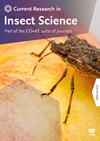Ecdysteroid kinase-like (EcKL) paralogs confer developmental tolerance to caffeine in Drosophila melanogaster
IF 2.7
Q1 ENTOMOLOGY
引用次数: 1
Abstract
A unique aspect of metabolic detoxification in insects compared to other animals is the presence of xenobiotic phosphorylation, about which little is currently understood. Our previous work raised the hypothesis that members of the taxonomically restricted ecdysteroid kinase-like (EcKL) gene family encode the enzymes responsible for xenobiotic phosphorylation in the model insect Drosophila melanogaster (Diptera: Ephydroidea)—however, candidate detoxification genes identified in the EcKL family have yet to be functionally validated. Here, we test the hypothesis that EcKL genes in the rapidly evolving Dro5 clade are involved in the detoxification of plant and fungal toxins in D. melanogaster. The mining and reanalysis of existing data indicated multiple Dro5 genes are transcriptionally induced by the plant alkaloid caffeine and that adult caffeine susceptibility is associated with a novel naturally occurring indel in CG31370 (Dro5-8) in the Drosophila Genetic Reference Panel (DGRP). CRISPR-Cas9 mutagenesis of five Dro5 EcKLs substantially decreased developmental tolerance of caffeine, while individual overexpression of two of these genes—CG31300 (Dro5-1) and CG13659 (Dro5-7)—in detoxification-related tissues increased developmental tolerance. In addition, we found Dro5 loss-of-function animals also have decreased developmental tolerance of the fungal secondary metabolite kojic acid. Taken together, this work provides the first compelling functional evidence that EcKLs encode detoxification enzymes and suggests that EcKLs in the Dro5 clade are involved in the metabolism of multiple ecologically relevant toxins in D. melanogaster. We also propose a biochemical hypothesis for EcKL involvement in caffeine detoxification and highlight the many unknown aspects of caffeine metabolism in D. melanogaster and other insects. Highlights Phosphorylation is an under-characterised detoxification reaction in insects Dro5 EcKL genes are good detoxification candidate genes in Drosophila melanogaster Knockout and misexpression of some Dro5 genes modulated tolerance to caffeine Dro5 genes may also confer tolerance to the fungal toxin kojic acid Caffeine tolerance could be adaptive for Drosophila associating with Citrus fruits表皮甾体激酶样(EcKL)类似性赋予黑腹果蝇对咖啡因的发育耐受性
与其他动物相比,昆虫代谢解毒的一个独特方面是存在外源磷酸化,目前对其知之甚少。我们之前的工作提出了一种假设,即在模式昆虫黑腹果蝇(双翅目:蝶科)中,分类上受限的外源性类固醇激酶样(EcKL)基因家族的成员编码负责外源磷酸化的酶——然而,在EcKL家族中发现的候选解毒基因尚未在功能上得到验证。在这里,我们验证了快速进化的Dro5分支中的EcKL基因参与了D. melanogaster植物和真菌毒素的解毒的假设。对现有数据的挖掘和再分析表明,植物生物碱咖啡因可诱导多个Dro5基因的转录,并且成体咖啡因敏感性与果蝇遗传参考小组(DGRP)中CG31370 (Dro5-8)的一个新的天然索引有关。CRISPR-Cas9诱变5个Dro5 EcKLs显著降低了咖啡因的发育耐受性,而在解毒相关组织中过量表达其中两个基因cg31300 (Dro5-1)和CG13659 (Dro5-7)增加了发育耐受性。此外,我们发现Dro5功能缺失动物对真菌次生代谢物曲酸的发育耐受性也降低。综上所述,这项工作提供了第一个令人信服的功能证据,证明EcKLs编码解毒酶,并表明Dro5分支中的EcKLs参与了D. melanogaster多种生态相关毒素的代谢。我们还提出了EcKL参与咖啡因解毒的生化假设,并强调了d.m anogaster和其他昆虫中咖啡因代谢的许多未知方面。Dro5 EcKL基因是黑腹果蝇良好的解毒候选基因,部分Dro5基因敲除和错表达可调节对咖啡因的耐受性。Dro5基因也可能赋予对真菌毒素曲酸的耐受性,咖啡因耐受性可能是与柑橘类水果相关的果蝇的适应性
本文章由计算机程序翻译,如有差异,请以英文原文为准。
求助全文
约1分钟内获得全文
求助全文
来源期刊

Current Research in Insect Science
Agricultural and Biological Sciences-Animal Science and Zoology
CiteScore
3.20
自引率
0.00%
发文量
22
审稿时长
36 days
 求助内容:
求助内容: 应助结果提醒方式:
应助结果提醒方式:


